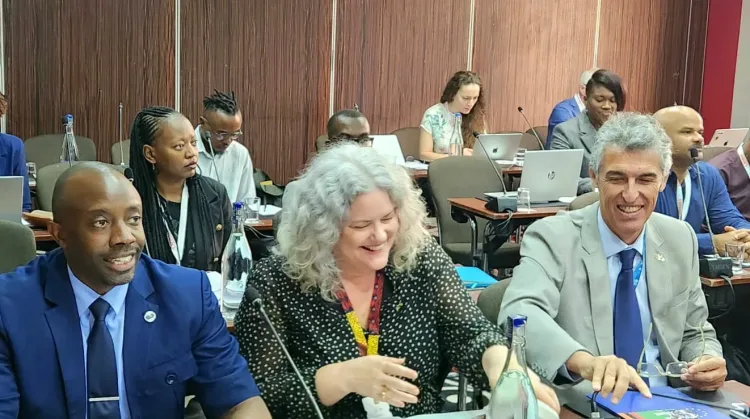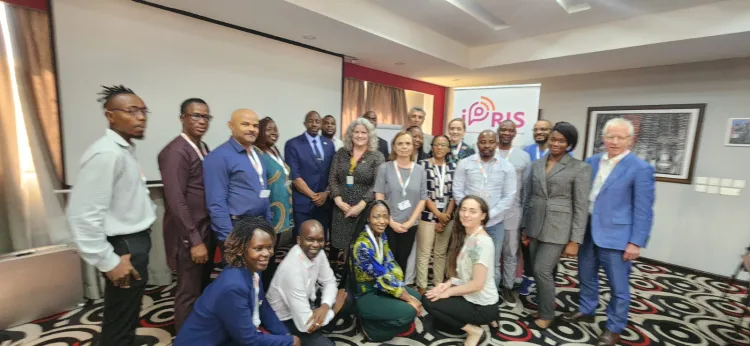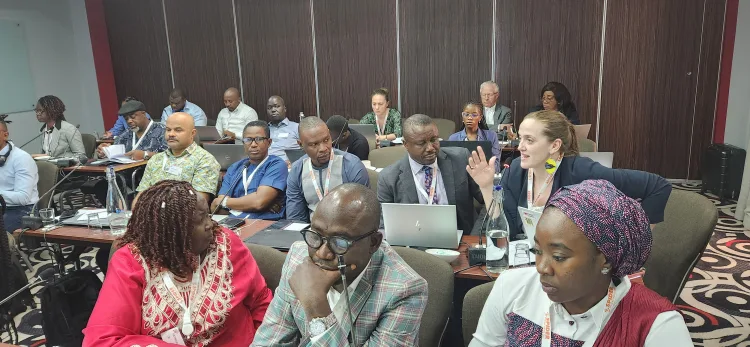[et_pb_section fb_built="1" admin_label="section" _builder_version="4.16" global_colors_info="{}"][et_pb_row admin_label="row" _builder_version="4.16" background_size="initial" background_position="top_left" background_repeat="repeat" global_colors_info="{}"][et_pb_column type="4_4" _builder_version="4.16" custom_padding="|||" global_colors_info="{}" custom_padding__hover="|||"][et_pb_text admin_label="Text" _builder_version="4.16" background_size="initial" background_position="top_left" background_repeat="repeat" global_colors_info="{}"]

The intensive four-day regional peer-to-peer capacity-building workshop (2023-A cohort) took place (March 18-22) in Lusaka, Zambia. The participants included seven of the 43 National Regulatory Organisations (NRAs) covered by iPRIS and representatives from the Regional Regulatory Organisations (RROs), in Africa including CRASA, WATRA, ARTAC and EACO (NRAs). The NRAs representatives include delegates from Kenya, South Sudan, Eswatini, Zambia, Sierra Leone, Nigeria and Namibia. This peer-to-peer capacity-building session followed the intensive Europe Regional session held in November 2023 in Sweden.
To be part of iPRIS, a country has to be part of a Regional Regulatory Organisation (RRO), notably CRASA, WATRA, ARTAC, and EACO. RROs are the regional governing bodies responsible for developing and enforcing ICT regulations, policies, and standards to promote fair competition, ensure consumer protection, and foster development and innovation within their respective sectors.

Eng. Choolwe Nalubamba, Director General of ZICTA, Susanna Hughes from the Embassy of Sweden in Zambia, and Claudio Bacigalupi from the European Union. Photo credit: iPRIS
During the opening on Monday 18th March,Claudio Bacigalupi from the European Union underscored the importance of collaboration in achieving regional harmonization and creating a more conducive environment for innovation, investment, and cross-border digital services. Bacigalui further added, “We want to have peer-to-peer cooperation between the European Union and African ICT regulators and have this is of utmost significance in achieving regional harmonisation. We are very happy to collaborate with Sweden in Luxembourg on this task; their collaborative approach can bring considerable benefits, including a more seamless digital ecosystem, enhanced Cross Border Services and greater opportunities.
Susanna Hughes from the Embassy of Sweden in Zambia remarked, “As you may know, even though Africa's share of the world's population is now 17%, its share of global trade is only 3%. There are many challenges to strengthening regional trade in order to achieve the aspirations of the African continental free trade area. She stressed the importance of ICT regulation as one of the important parts of the puzzle towards creating an interconnected digital ecosystem. “It's clear that better regional ICT harmonisation can strengthen cross-border digital services and economic growth. So while the challenges are many, the potential benefits are great”, she remarked. In her conclusion, Susanna Hughes stated, “As regulators, you will have an important responsibility to encourage competition while also ensuring digital inclusion and accessibility.”
During his address, Eng. Choolwe Nalubamba, Director General of ZICTA and host for the week stated, “Zambia has been one of the longest beneficiaries of the project, and there are a few issues that we can point to that we have benefited from this partnership, which include the work that we're doing under the digital financial services.”

iPRIS Cohort 2023-A Participants at the Regional Workshop in Zambia
The second day of the iPRIS Africa Regional peer-to-peer capacity building workshop for the 2023 A cohort) included sessions on cybersecurity, risk assessment for 5G networks, project management, inclusion and broadband deployment.





iPRIS aims to bridge the digital divide by boosting the capacities of African telecommunications regulatory authorities through peer-to-peer learning. The regulators participating in the project include National Regulatory Authorities and Regional Regulatory Organisations across sub-Saharan Africa.
iPRIS is implemented by SPIDER (the Swedish Program for ICT in Developing Regions), the Swedish Post and Telecom Authority (PTS), and the Luxembourg Regulatory Institute (ILR). In collaboration with the African Regional Regulatory Organisations, the implementers support the participating National Regulatory Authorities to achieve their strategic change initiatives.
iPRIS is funded by the European Union, Sweden, and Luxembourg as part of the Team Europe Initiative “D4D for Digital Economy and Society in Sub-Saharan Africa” (Code: 001).
[/et_pb_text][/et_pb_column][/et_pb_row][/et_pb_section]
[et_pb_section fb_built="1" admin_label="section" _builder_version="4.16" global_colors_info="{}"][et_pb_row admin_label="row" _builder_version="4.16" background_size="initial" background_position="top_left" background_repeat="repeat" global_colors_info="{}"][et_pb_column type="4_4" _builder_version="4.16" custom_padding="|||" global_colors_info="{}" custom_padding__hover="|||"][et_pb_code _builder_version="4.23.1" _module_preset="default" global_colors_info="{}"][/et_pb_code][et_pb_text admin_label="Text" _builder_version="4.16" background_size="initial" background_position="top_left" background_repeat="repeat" global_colors_info="{}"]
During November 2023, national regulators from Eswatini, Kenya, Namibia, Sierra Leone, South Sudan and Zambia took part in a 2.5 weeks training programme in Stockholm, Sweden as part of the European phase of the iPRIS training.
Alexandra Högberg from SPIDER Center interviewed Dr. Emma Otieno from the Communications Authority of Kenya along the Sweden 2023 phase. In this interview, Dr. Emma Otieno weighs in on the important role national regulators play in ensuring affordability and digital inclusion.
This interview has been edited for clarity and readability.
Emma Otieno: My name is Dr. Emma Otieno. I work with the national regulator that is the Communications Authority of Kenya. Communication authority of Kenya is a regulatory body for the ICT industry, in Kenya. Within the regulator, I work in the Universal Service Fund function, where we actually seek to support the country in achieving its digital transformation agenda through running out projects for digital inclusivity.
Alexandra Högberg: What role do you see the regulator's playing in ensuring that Africa takes its share of the digital transformation revolution?
EO: I think the regulator is the most critical institution within the government set up for the development of ICTs. This is because the regulator is the key link between the national discussion and the global discussion, and as we all know, is that ICT development has now become a boundaries, a kind of an undertaking, and we need to have this conversation with partners with collaborators and financiers, with donors, with the technical minds, and it is a conversation that cannot happen in country. So with the regulatory linkage between the association starting from the regional associations, for instance, in East Africa, we have the East Africa community communication organisation. At the African level, we have the Africa Telecommunications Union, then we move on to like institutions like the International Telecommunications Union, that is the ITU. So, these are linkage that the regulator creates between the internal and external is the most critical. Secondly, the regulator has the expertise in terms of the different segments of what we require for digital development of digital transformation. We know about issues over competition management, Universal Service Fund, quality management, making communication services affordable, accessible, and also in terms of ensuring that there is equity. So the regulator is a person or an institution that ensures us this is all happening in a coordinated manner.
AH: What are the challenges and opportunities nationally and regionally that you think you want to highlight in terms of ensuring that we leave no one behind?
EO: There are several challenges, especially in the developing country. One is the affordability of communication services. That is an issue that we really have to address because of competing interests between how to access food, how to access other basic essentials, and communication, which has just joined this segment of what we would call basic necessities. So the cost of communication services, the cost of broadband, the cost of buying airtime, the cost of devices. And this is not being made better by the rate at which the inflation is happening in developing countries, taxation issues, these are really becoming top of the issues causing affordability or access to services. And then of course, the nature of policies that we are adopting in the developing countries and the rate at which these policies have been changed and very slow. So coming up with synergies between the legislation, the executive, and even the judiciary, arms of government so that they can bring synergy to come up with policies and regulations that are working towards enhancing affordability enhancing accessibility, enhancing availability over ICTs is quite an issue that we see, and then there's another issue in terms of like the devices. Other than affording the service itself, access to devices in Africa because we are not a manufacturing segment of the globe, most of the times we import devices. So smart handsets, which are actually the basic of accessing broadband have become quite expensive and with the increase in the exchange rates we are seeing right now the dollar rate is going higher and higher by the day. So that means that whatever is being imported, is actually costing more. So that is really becoming an encumbrance in terms of how we can actually ensure that people have access to device, so they already have a smart device, you cannot access broadband. And also the cost of rolling out broadband is not easy. The government's are competing with budgets. They have many, many interests, education, health. So actually, investing in rolling out infrastructure has also become quite a challenge for the countries in the developing side of this world. So affordability issues or financing, issues of devices, issues of policies and regulations that are actually ensuring that in diversity, equity inclusion, quite some of these things that we must collaboratively look at to ensure that no one is left behind.
AH: Thank you.
[/et_pb_text][/et_pb_column][/et_pb_row][/et_pb_section]
Borgarfjordsgatan 12, Kista,SWEDEN
Postal Address: Stockholm University, Department of Computer and Systems Sciences/DSV, SPIDER, P.O Box 1073, SE-164 25 Kista, Sweden
Copyright © 2024 iPRIS. All rights reserved.